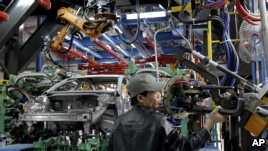VOA慢速英语:在反华抗议之后,投资者重返越南(双语)
- 参考译文
- 听力原文
Foreign Investors Return to Vietnam after Anti-China Protests
在反华抗议之后,外国投资者重返越南
From VOA Learning English, this is the Economics Report.
这里是美国之音慢速英语经济报道。
In May, anti-China protesters in Vietnam caused damage to at least 460 factories owned by foreigners. Thousands of foreign investors fled Vietnam. They fear there would be more riots. But foreign investment has now returned to level standard existed before the protests.
今年五月,越南的反华抗议者破坏了至少460家外资工厂,致使无数外国投资者逃离越南。这些投资者担心会有更多的骚乱破坏。但是现在外资已经回到抗议前的正常水平。
The flow of money returned for three main reasons. The government has promised to protect for investors, also the economy continues to grow. Finally, the cost of manufacturing remains low. Clothing, furniture and electronics factories have began operating again in Vietnam.
外资重返越南的三个主要原因是,越南政府已经承诺保护外国投资者,而且经济在继续往前发展。最后,制造业的成本依旧很低。越南的服装厂、家具厂和电子厂又开始运营起来。
20 people dead in protests and hundreds were injured. The protesters were angry about China's placement of an oil industry structure in waters that Vietnam claims as its territory. Long-term tensions between the two countries worsened. China and Vietnam fought a border war in 1979.
在这次抗议中,有20人死亡,数百人受伤。这些抗议者当时对中国在越南声称拥有主权的海域安放石油平台非常愤怒,这也致使两国的长期紧张关系进一步恶化。1979年,中越两国曾打了一场边境战争。
Foreign investment is 17 percent of Vietnam's economy and 66 percent of its exports. It provides half of Vietnam's tax income. Ralf Matthaes is the owner of a market advising company in Ho Chi Minh city. He says foreign investment has returned because of the government's strong actions.
在越南经济中,外资占到17%,并且外资占到越南出口的66%,还占越南税收的一半。拉尔夫·马蒂士是胡志明市一家市场咨询公司的老板,他称,由于越南政府的强力措施,外资又回来了。
Foreign investors from Japan, Singapore, South Korea and Taiwan have entered Vietnam since the government ended investment restrictions in 1987. Their projects have helped support Vietnam's $155 billion economy and have lowered poverty by adding jobs.
自从1978年越南政府结束投资限制,来自日本、新加坡、韩国和中国台湾的外国投资者纷纷进军越南市场。他们的投资项目帮助支持了越南价值1550亿美元的经济,并通过添加工作降低了贫困。
In July, China moved the platform following talks with Vietnam. Before the riots China was the seventh largest investor in Vietnam. Last year, it invested $2.3 billion in the country, that was six times more than in 2012. Much of that investment was materials use to make clothing, machines and other goods.
今年7月,在和越南进行了数次谈判之后,中国移走了石油平台。在骚乱前,中国是越南的第七大投资国。去年,中国在越南投资了23亿美元,是2012年的6倍多。其中多数投资是用于制作服装、机器和其他商品的原材料。
In the future, Vietnam is expected to make it easier for foreign investors to do business in the country. It will increase the rights of foreign investors to use land. And it will build new transportation systems linking Ho Chi Minh City to manufacturing areas.
将来,越南预计会令外国投资者在该国做生意变得更加方便容易。该国将会提高外国投资者在越南使用土地的权利,并会建立可以连接胡志明市和制造业地区的新交通体系。
And that's the Economics Report from VOA Learning English. I'm Mario Ritter.
这就是本期的美国之音慢速英语经济报道的全部内容,我是马里奥·里特。
Foreign Investors Return to Vietnam after Anti-China Protests
From VOA Learning English, this is the Economics Report.
In May, anti-China protesters in Vietnam caused damage to at least 460 factories owned by foreigners. Thousands of foreign investors fled Vietnam. They fear there would be more riots. But foreign investment has now returned to level standard existed before the protests.
The flow of money returned for three main reasons. The government has promised to protect for investors, also the economy continues to grow. Finally, the cost of manufacturing remains low. Clothing, furniture and electronics factories have began operating again in Vietnam.
 |
20 people dead in protests and hundreds were injured. The protesters were angry about China's placement of an oil industry structure in waters that Vietnam claims as its territory. Long-term tensions between the two countries worsened. China and Vietnam fought a border war in 1979.
Foreign investment is 17 percent of Vietnam's economy and 66 percent of its exports. It provides half of Vietnam's tax income. Ralf Matthaes is the owner of a market advising company in Ho Chi Minh city. He says foreign investment has returned because of the government's strong actions.
Foreign investors from Japan, Singapore, South Korea and Taiwan have entered Vietnam since the government ended investment restrictions in 1987. Their projects have helped support Vietnam's $155 billion economy and have lowered poverty by adding jobs.
In July, China moved the platform following talks with Vietnam. Before the riots China was the seventh largest investor in Vietnam. Last year, it invested $2.3 billion in the country, that was six times more than in 2012. Much of that investment was materials use to make clothing, machines and other goods.
In the future, Vietnam is expected to make it easier for foreign investors to do business in the country. It will increase the rights of foreign investors to use land. And it will build new transportation systems linking Ho Chi Minh City to manufacturing areas.
And that's the Economics Report from VOA Learning English. I'm Mario Ritter.
- 频道推荐
- |
- 全站推荐
- 推荐下载
- 网站推荐




















